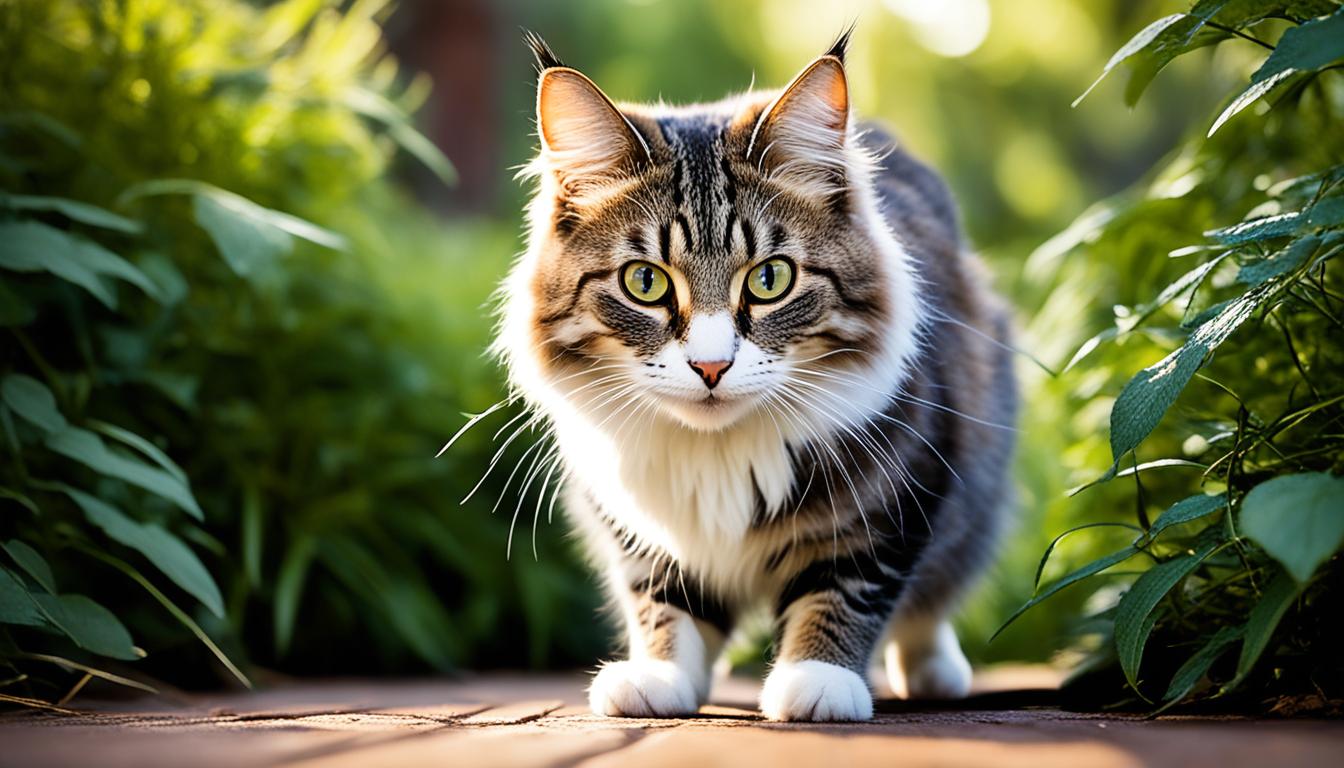Cats are fascinating creatures with a rich history of hunting. Their predatory instincts have been finely tuned over thousands of years, making them expert hunters in the wild. But even our domesticated feline friends retain these innate behaviors. Understanding your cat’s hunting instincts is essential in providing them with a fulfilling and enriched life.
Predatory instincts in cats are deeply rooted in their genetics. They have evolved to be skilled stalkers, pouncers, and capturers of prey. These behaviors are an intrinsic part of their nature, and it’s crucial to recognize and respect this aspect of their behavior.
By understanding your cat’s hunting instincts, you can create an environment that allows them to engage in their natural behaviors. This not only keeps them mentally and physically stimulated but also helps maintain their overall well-being.
Key Takeaways:
- Cats have an innate hunting instinct that is deeply rooted in their genetics.
- Understanding your cat’s hunting instincts is vital for providing them with appropriate mental and physical stimulation.
- Cats exhibit a range of hunting behaviors, including stalking, pouncing, and capturing prey.
- Providing interactive toys and engaging in regular play sessions can help satisfy your cat’s hunting instincts.
- Creating indoor environments with hiding spots and perches allows your cat to engage in natural hunting behaviors.
Factors that Influence Hunting Instincts in Cats
Understanding your cat’s hunting instincts involves considering the various factors that can impact their behavior. Cats have unique hunting patterns, prey drive, and instinctual strategies that are influenced by multiple elements.
Early Experiences and Socialization
One significant factor that influences a cat’s hunting instincts is their early experiences and socialization with humans. Cats that are handled by humans during the critical developmental period between 3 and 7 weeks of age are more likely to exhibit friendly and social behaviors. This early interaction helps shape their hunting instincts and overall behavior.
Influence of Parents
Research shows that the personality and behavior of the tomcat that sires the kittens can have an impact on their friendliness and sociability. A cat’s hunting instincts may be influenced by the genetic traits inherited from their parents, including their prey drive and hunting strategies.
Breed-Specific Behaviors
Certain cat breeds may exhibit specific hunting behaviors and prey drives. For example, some breeds may have a higher prey drive and exhibit more intense hunting behaviors than others. Understanding the specific tendencies of your cat’s breed can help you better address and manage their hunting instincts.
To ensure a comprehensive understanding of your cat’s hunting instincts, it’s essential to consider these factors and tailor your approach accordingly. By recognizing the influence of early experiences, genetics, and breed-specific behaviors, you can better cater to your cat’s natural instincts.

Understanding and Managing Your Cat’s Hunting Instincts
To understand and manage your cat’s hunting instincts, it’s important to provide them with appropriate outlets for their predatory behaviors. Cats are natural hunters and need opportunities to engage in activities that simulate their hunting instincts. Interactive toys that mimic prey, such as feather wands or toy mice, can be a great way to satisfy your cat’s hunting instincts while providing mental and physical stimulation.
In addition to toys, engaging in regular play sessions with your cat is crucial. Take the time to interact with them using toys that encourage stalking, pouncing, and capturing behaviors. This not only helps satisfy their hunting instincts but also strengthens the bond between you and your feline friend.
Creating a cat-friendly environment indoors is another important aspect of managing your cat’s hunting instincts. Provide them with hiding spots and perches where they can observe their surroundings and engage in natural hunting behaviors, such as stalking. This can be achieved by setting up cat trees, shelves, or adding hiding places like cardboard boxes or tunnels.
Finally, it’s essential to ensure that your cat’s diet is balanced and appropriate. By providing them with high-quality cat food that meets their nutritional needs, you can help satisfy their hunting instincts and prevent them from seeking out alternative prey. Consult with your veterinarian to determine the best diet for your cat based on their age, breed, and overall health.
FAQ
What is a cat’s hunting instinct?
A cat’s hunting instinct is an innate behavior that drives them to stalk, pounce, and capture prey. It is deeply rooted in their genetics and has been shaped by thousands of years of natural selection.
What factors influence a cat’s hunting instincts?
Several factors can influence a cat’s hunting instincts. Early experiences and socialization with humans, the influence of their parents, and certain cat breeds can all impact a cat’s hunting behaviors and prey drive.
How can I understand and manage my cat’s hunting instincts?
To understand and manage your cat’s hunting instincts, provide them with appropriate outlets for their predatory behaviors. This includes interactive toys, regular play sessions, creating environments with hiding spots and perches, and ensuring a balanced diet.

